by Graduate Student Government
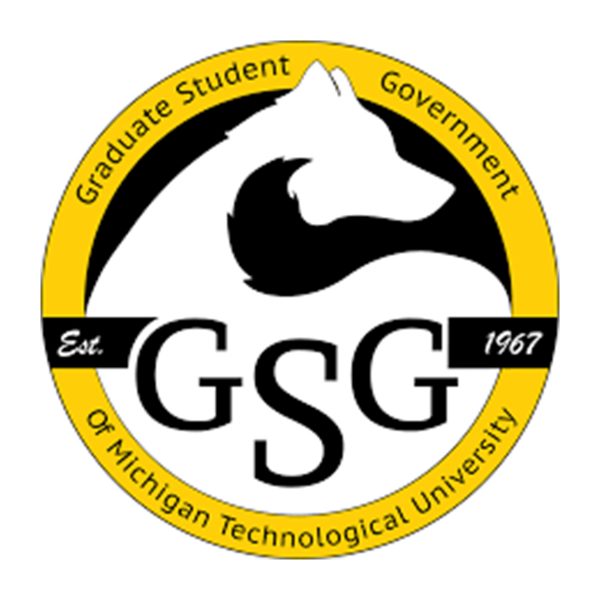
The Graduate Student Government (GSG) is pleased to announce a hybrid poster presentation session at Alumni Reunion 2021, which will be held Aug. 6.
Due to the ongoing pandemic, GSG has decided to combine physical posters with prerecorded presentations from participants. This has been decided to keep in mind the health and safety of everyone who is going to be a part of this event, since the COVID-19 pandemic is still ongoing.
The Alumni Reunion poster presentation session is a continued tradition designed to increase interaction between graduate students and MTU alumni. It is a unique opportunity for graduate students to share their research work and expand network connections. This event is also a great opportunity for students to work on their presentation skills and prepare for upcoming conferences. Alumni will be able to give valuable insight and feedback on the videos that appeal to them.
Participation is open to graduate students from all departments. The event will consist of elevator-pitch-style poster presentations, with physical posters and prerecorded presentations by participants. This hybrid setup will allow alumni to take a closer look at the physical posters and everyone to view the video presentations for the respective posters. Registration closes on July 16 at 11:59 p.m. Limited seats only. Don’t wait — register today.
Detailed instructions and guidelines for recording your presentation will be sent out to you once you have registered. Alternatively, you will also be able to find the instructions on the GSG website. The deadline for participants to submit their presentation videos is July 30.
For more information, please contact Shreya Joshi at gsg-research@mtu.edu.
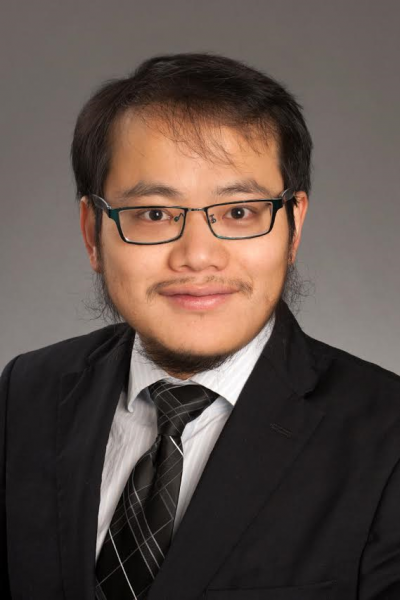
Jidong Xiao, an assistant professor in the computer science department at Boise State University, will present a talk on Wednesday, May 12, at 3:00 p.m.
Dr. Xiao’s research focuses on computer security, especially computer system security and cloud security.
In his talk, “Identifying New Threats in Cloud Environments,” Dr. Xiao will present two research projects focusing on a concept called virtual machine extrospection and a new type of rootkit, which allows attackers to perform active or passive attacks in a nested virtualization environment.
Talk Title
Identifying New Threats in Cloud Environments
Talk Abstract
Cloud computing has become prevalent over the past decade. While individuals and organizations rely on cloud computing more and more, various security problems in cloud platforms are discovered. In this talk, I will present two research projects. In the first project, I will present a concept called virtual machine extrospection, in which attackers or cloud customers collect sensitive information about the physical machine from within a virtual machine. In the second project, I will present a new type of rootkit, which allows attackers to perform active or passive attacks in a nested virtualization environment, and then I will describe our detection approach. At the end of the talk, I will briefly discuss my future research projects and plans.
Biography
Dr. Jidong Xiao is an assistant professor in the computer science department at Boise State University. His research focuses on computer security, especially computer system security and cloud security. He received his PhD degree in computer science from the College of William and Mary. Prior to joining Boise State University, he spent approximately 5 years in industry working at Intel and Symantec.
Dr. Xiao’s research was recognized in different venues, including publications that won the best paper award at the USENIX Large Installation System Administration Conference (LISA) 2015, won the distinguished poster award at the Network and Distributed System Security Symposium (NDSS) 2016, and won the best paper award nomination at the International Conference on Dependable Systems and Networks (DSN) 2020. Dr. Xiao has been awarded several grants by the NSF, NSA, and the Army Research Office (ARO).
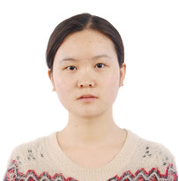
Jingjing Yao, a PhD candidate at New Jersey Institute of Technology, will present a talk on Tuesday, May 11, at 3:00 p.m,.
In her talk, “Intelligent and Secure Fog-Aided Internet of Drones,” Yao discusses the utilization of energy harvesting technology to charge drone batteries and investigate wireless power control to adjust the drone wireless transmission power to reduce drone energy consumption.
Yao’s research interests include Internet of Things (IoT), Internet of Drones (IoD), Deep Reinforcement Learning, Federated Learning, Cybersecurity, Mobile Edge Computing/Caching, and Energy Harvesting.
Talk Title
Intelligent and Secure Fog-Aided Internet of Drones
Talk Abstract
Internet of drones (IoD), which deploys several drones in the air to collect ground information and send them to the IoD gateway for further processing, can be applied in traffic surveillance and disaster rescue. Fog-aided IoD provisions future events prediction and image classification by machine learning technologies, where massive training data are collected by drones and analyzed in the fog node. However, the performance of IoD is greatly affected by drones’ battery capacities. Also, aggregating all data in the fog node may incur huge network traffic and drone data privacy leakage. The speaker will share her vision and research to address these two challenges.
In this talk, the speaker utilizes energy harvesting technology to charge drone batteries and investigate wireless power control to adjust the drone wireless transmission power to reduce drone energy consumption. The joint optimization of power control and energy harvesting scheduling is investigated in time-varying IoD networks to minimize the long-term average system energy cost constrained by the drone battery capacities and quality of service (QoS) requirements. A modified actor-critic deep reinforcement learning algorithm is designed to address the joint optimization problem in time-varying IoD networks.
To prevent the privacy leakage of IoD, the speaker utilizes federated learning (FL) by performing local training in drones and sharing all training model parameters in the fog node without uploading drone raw data. However, drone privacy can still be divulged to ground eavesdroppers by wiretapping and analyzing uploaded parameters during the FL training process. The power control problem is hence investigated to maximize the FL system security rate constrained by drone battery capacities and the FL training time requirement. An algorithm with low computational complexity is then designed to tackle the security rate maximization problem and its performance is demonstrated by extensive simulations.
Biography
Jingjing Yao is a Ph.D. candidate in Computer Engineering with the Department of Electrical and Computer Engineering at the New Jersey Institute of Technology (NJIT). She will receive her Ph.D. degree from NJIT in May 2021.
She received the M.E. degree in Information and Communication Engineering from the University of Science and Technology of China (USTC), and the B.E. degree in Information and Communication Engineering from the Dalian University of Technology (DUT).
She has published 13 first-author journal articles and 7 first-author conference papers. Her research interests include Internet of Things (IoT), Internet of Drones (IoD), Deep Reinforcement Learning, Federated Learning, Cybersecurity, Mobile Edge Computing/Caching, and Energy Harvesting.
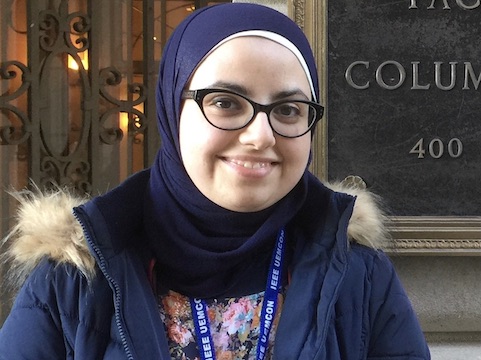
Tara Salman, a final-year PhD candidate at Washington University in St. Louis, will present a talk on Tuesday, April 27, 2021, at 3:00 p.m.
In her talk, “A Collaborative Knowledge-Based Security Solution using Blockchains,” she will present her work on redesigning the blockchains and building a collaborative, distributed, intelligent, and hostile solution that can be used for security purposes.
Talk Title
A Collaborative Knowledge-Based Security Solution using Blockchains
Talk Abstract
Artificial intelligence and machine learning have recently gained wide adaptation in building intelligent yet simple and proactive security solutions such as intrusion identification, malware detection, and threat intelligence. With the increased risk and severity of cyber-attacks and the distributed nature of modern threats and vulnerabilities, it becomes critical to pose a distributed intelligent solution that evaluates the systems’ and networks’ security collaboratively. Blockchain, as a decade-old successful distributed ledger technology, has the potential to build such collaborative solutions. However, to be used for such solutions, the technology needs to be extended so that it can intelligently process the stored information and achieve a collective decision about security risks or threats that might target a system.
In this talk, I will present our work on redesigning the blockchains and build a collaborative, distributed, intelligent, and hostile solution that can be used for security purposes. In particular, we will discuss our work on (1) extending blockchains for general collaborative decision-making applications, where knowledge should be made out of decisions, risks, or any information stored on the blockchain; (2) applying the proposed extensions to security applications such as malware detection and threat intelligence.
Biography
Tara Salman is a final year Ph.D. candidate at Washington University in St. Louis, where she is advised by Raj Jain. She previously received her MS and BSc degrees from Qatar University in 2015 and 2012, respectively. Her research aims to integrate state-of-the-art technologies to provide scalable, collaborative, and intelligent cybersecurity solutions.
Her recent work focuses on the intersection of artificial intelligence, blockchains, and security applications. The work spans several fields, including blockchain technology, security, machine learning, and deep learning applications, cloud computing, and the Internet of Things. She has been selected for the EECS Rising Star in UC Berkeley 2020. Her research has been published in more than twenty internationally recognized conferences and journals and supported by national and international funds.
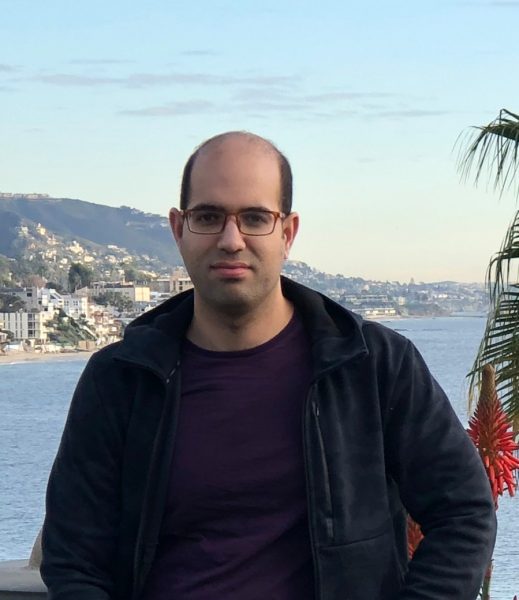
Dr. Ali Yekkehkhany, a postdoctoral scholar at the University of California, Berkeley, will present a talk on Thursday, May 6, 2021, at 3:00 p.m.
He will discuss adversarial attacks on the computation of reinforcement learning and risk-aversion in games and online learning.
Dr. Yekkehkhany’s research interests include machine/reinforcement learning, queueing theory, applied probability theory and stochastic processes.
Talk Title
Adversarial Reinforcement Learning, Risk-Averse Game Theory and Online Learning with Applications to Autonomous Vehicles and Financial Investments
Talk Abstract
In this talk, we discuss:
- a) Adversarial attacks on the computation of reinforcement learning: The emergence of cloud, edge, and fog computing has incentivized agents to offload the large-scale computation of reinforcement learning models to distributed servers, giving rise to edge reinforcement learning (RL). By the inherently distributed nature of edge RL, the swift shift to this technology brings a host of new adversarial attack challenges that can be catastrophic in safety-critical applications. A natural malevolent attack could be to contaminate the RL computation such that the contraction property of the Bellman operator is undermined in the value/policy iteration methods. This can result in luring the agent to search among suboptimal policies without improving the true values of policies. We prove that under certain conditions, the attacked value/policy iteration methods converge to the vicinity of the optimal policy with high probability if the number of value/policy evaluation iterations is larger than a threshold that is logarithmic in the inverse of a desired precision.
- b) Risk-aversion in games and online learning: The fast-growing market of autonomous vehicles, unmanned aerial vehicles, and fleets in general necessitates the design of smart and automatic navigation systems considering the stochastic latency along different paths in a traffic network. To our knowledge, the existing navigation systems including Google Maps, Waze, MapQuest, Scout GPS, Apple Maps, and others are based on minimizing the expected travel time, ignoring the path delay uncertainty. To put the travel time uncertainty into perspective, we model the decision making of risk-averse travelers in a traffic network by an atomic stochastic congestion game and propose three classes of risk-averse equilibria. We show that the Braess paradox may not occur to the extent presented originally and the price of anarchy can be improved, benefiting the society, when players travel according to risk-averse equilibria rather than the Wardrop/Nash equilibrium. Furthermore, we extend the idea of risk-aversion to online learning; in particular, risk-averse explore-then-commit multi-armed-bandits. We use data from the New York Stock Exchange (NYSE) to show that the classical mean-variance and conditional value at risk approaches can come short in addressing risk-aversion for financial investments. We introduce new venues to study risk-aversion by taking the probability distributions into account rather than the summarized statistics of distributions.
Biography
Ali Yekkehkhany is a postdoctoral scholar with the Department of Industrial Engineering and Operations Research, University of California, Berkeley. He received his PhD and MSc degrees in Electrical and Computer Engineering from the University of Illinois, Urbana-Champaign (UIUC) in 2020 and 2017, respectively, and BSc degree in Electrical Engineering from Sharif University of Technology in 2014.
He is the recipient of the “best poster award in recognition of high-quality research, professional poster, and outstanding presentation” in the 15th CSL Student Conference, 2020, and the “Harold L. Olesen award for excellence in undergraduate teaching by graduate students” in the 2019-2020 academic year at UIUC. He was chosen as “teachers ranked as excellent” twice and “teachers ranked as excellent and outstanding” twice at UIUC.
His research interests include machine/reinforcement learning, queueing theory, applied probability theory and stochastic processes.

A team of Michigan Tech students competed last week in the International Collegiate Programming Contest (ICPC) North America Division Championships, placing 28th out of 42 teams in the Central Division.
To qualify for the Championships, a Michigan Tech student team placed 14th out of more than 80 teams in the regional ICPC contest this February. Students on that team were Alex Gougeon (Software Engineering), Ben Wireman (Mathematics), and Dominika Bobik.
Students interested in the programming competitions are encouraged to contact Dr. Laura Brown, Computer Science. Additional programming contests and events take place throughout the year.
The International Collegiate Programming Contest is the premier world-wide, algorithmic programming contest for college students.
In ICPC competitions, teams of three students work to solve the most real-world problems efficiently and correctly. Teams represent their university in multiple levels of competition: regionals, divisionals, championships, and world finals.
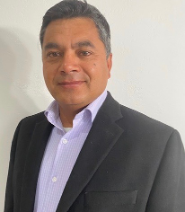
Dr. Dukka KC, Electrical Engineering and Computer Science, Wichita State University, will present a talk on Wednesday, May 5, 2021, at 3:00 p.m.
Dr. KC will discuss some past and ongoing projects in his lab related to machine learning/deep learning-based approaches for an important problem in Bioinformatics: protein post-translational modification.
Talk Title
Bioinformatics as an emerging field of Data Science: Protein post-translation modification prediction using Deep Learning
Talk Abstract
In this talk, I will be presenting about some of the past and ongoing projects in my lab especially related to Machine Learning/Deep Learning based approaches for one of the important problems in Bioinformatics – protein post-translational modification.
Especially, I will focus on our endeavors to get away from manual feature extraction (hand-crafted feature extraction) from protein sequence, use of notion of transfer learning to solve problems where there is scarcity of labeled data in the field, and stacking/ensemble-based approaches.
I will also summarize our future plans for using multi-label, multi-task and multi-modal learning for the problem. I will highlight some of the ongoing preliminary works in disaster resiliency. Finally, I will provide my vision for strengthening data science related research, teaching, and service for MTU’s college of computing.
Biography
Dr. Dukka KC is the Director of Data Science Lab, Director of Data Science Efforts, Director of Disaster Resilience Analytics Center and Associate Professor of Electrical Engineering and Computer Science (EECS) in the Department of EECS at Wichita State University. His current efforts are focused on application of various computing/data science concepts including but not limited to Machine Learning, Deep Learning, HPC, etc. for elucidation of protein sequence, structure, function and evolution relationship among others.
He has received grant funds totaling $4.25M as PIs or Co-PIs, spanning 17 funded grants. He was the PI on the $499K NSF Excellence in Research project focused on developing Deep Learning based approaches for Protein Post-translational modification sites.
He received his B.E. in computer science in 2001, his M.Inf. in 2003 and his Ph.D. in Informatics (Bioinformatics) in 2006 from Kyoto University, Japan. Subsequently he did a postdoc at Georgia Institute of Technology working on refinement algorithms for protein structure prediction. He then moved to UNC-Charlotte and did another postdoc working on functional site predictions in proteins. He was a CRTA Fellow in National Cancer Institute at National Institutes of Health where he was working on intrinsically symmetric domains.
Prior to his arrival at WSU, he was associate professor and graduate program director in the Department of Computational Science and Engineering at North Carolina A&T State University.
Dr. KC has published more than 30 journal and 20 conference papers in the field and is associate editor for two leading journals (BMC Bioinformatics and Frontiers in Bioinformatics) in the field. He also dedicates much of his efforts to K-12 education, STEM workforce development, and increasing diversity in engineering and science.
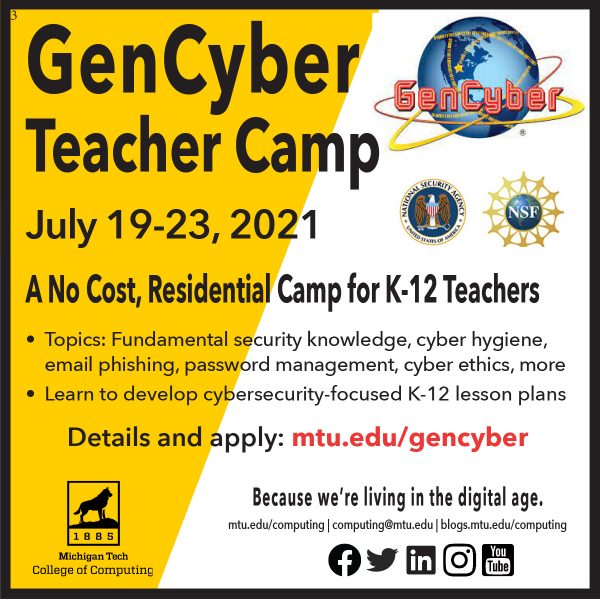
An NSA/NSF GenCyber Cybersecurity Teacher Camp for K-12 teachers will take place at Michigan Tech the week of July 19 – 23, 2021. This residential camp is offered at no cost to all participants.
Topics include fundamental security knowledge, cyber hygiene, and other topics such as email phishing, password management, and cyber ethics. Participants will also learn how to develop lesson plans to teach cybersecurity in K-12.
Room and board are included. Each teacher participant will receive a stipend of $500 for attending and completing camp activities. Commuting is also possible. Camp activities will count for 25 State Continuing Education Clock Hours (SCECH).
Find complete details and apply here. The application deadline is May 1, 2021.
Funding of the camp is provided jointly by the National Security Agency (NSA) and the National Science Foundation (NSF) through a grant award led by Professor Yu Cai and Tim Van Wagner, both from the College of Computing Department of Applied Computing.
Watch a video from the 2019 GenCyber Teacher Camp below.
by Yu Cai, College of Computing
A GenCyber Cybersecurity Teacher Camp for K-12 teachers will be held at Michigan Tech during the week of July 19 – 23. Participants will learn cyber hygiene and fundamental security knowledge including email phishing, password management, and cyber ethics. Participants will also learn how to develop lesson plans to teach cybersecurity in K-12.
This is a residential camp (commuting optional), and is offered at NO COST to all participants. Room and board is included. Each teacher participant will receive a stipend of $500 for attending and completing camp activities. Camp activities will count for 25 State Continuing Education Clock Hours (SCECH).
Click here for more information and to apply. The application deadline is May.
Funding for the camp is provided jointly by the National Security Agency (NSA) and the National Science Foundation (NSF) through an award led by Yu Cai and Tim Van Wagner from the College of Computing.